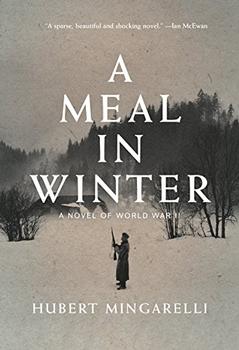Summary | Excerpt | Reviews | Beyond the book | Read-Alikes | Genres & Themes | Author Bio

In 1991 Martin Amis' Booker Prize-nominated novel, Time's Arrow, garnered much praise for its reverse narrative where the protagonist, a German doctor, begins the novel as an old man living in America but travels back through time to Auschwitz where he assists in the torture and murder of Jews. In contrast, in The Zone of Interest Auschwitz is not the destination, but rather the substance and subject of the whole novel as Amis explores the Nazi final solution through the eyes of three narrators: two Germans and one Jew.
Golo Thomson is an easy-going and good-natured officer living in the Auschwitz facility but actually employed to develop and run the Buna-Werke an immense factory built to produce rubber for the German government using Jewish slave labor. Outwardly the ideal Nazi, with blond good looks and an uncle close to Hitler, Golo is more of an ordinary man, placed by circumstance and history in intolerable circumstances. No hero, but a growing subversive, he lusts after and then falls in love with Hannah Doll, the wife of the Auschwitz Commandant, Paul Doll, the story's second narrator.
Doll's task is to oversee the business of Auschwitz, what he calls "the Protective Custody business." This involves meeting the trainloads of Jewish deportees sent to "the Zone," separating those who are to be sent to work in Buna-Werke and then disposing the vast numbers left behind. Amis spares the reader none of the horrors of Doll's task, from the stink of the ironically named "Spring Meadow" to the counting of femurs from the pyres of burned bodies, not forgetting, of course, to divide the number by two.
Lastly Amis gives us the voice of Szmul, a tragic figure who describes himself as the saddest and most disgusting man in the world. Szmul is the longest serving Jew in a squad that Paul Doll uses to deal with the bodies of his Jewish prisoners.
How do these men do what they do? That is the question Amis asks of his three characters and by inference he also urges his reader to consider how he or she might exist in this "Walpurgisnacht." Walpurgisnacht – in English, Walpurgis Night - is a holiday held in Germany on April 30 celebrating a meeting of witches. In The Zone of Interest, Amis uses the term to describe a time when it is possible to cross between seen and unseen worlds and he expands on this to describe the Third Reich as a whole as a kind of Walpurgisnacht, a time where the boundaries between life and death seem to have disappeared, and people act in ways they could not have imagined.
As Paul Doll says, "You are never in anybody's place...No one knows themselves. Who are you? I don't know. Then you come to the Zone of Interest, and it tells you who you are."
The Zone of Interest is difficult to read and not just because of the subject matter. As a novel it has some weaknesses. The narrative is highly fragmented and Amis' attempts at comedy at times seem gauche and inappropriate. And yet the fragmented narration is also a strength. Who can look at such horror for sustained periods of time? Not the reader and certainly not the three men telling the story. The choppy switches that Amis creates between the mechanics of mass genocide and scenes of domesticity and child rearing are also highly moving. Equally the comedic interplay between characters, particularly the over-sexed Ayran Golo and the increasingly insane Paul Doll, although jarring to read, is in fact wholly appropriate, driving home the unpalatable reality that the extermination of Jewish people carried out at Auschwitz was a crime perpetrated by complex human beings, living, laughing, loving and loathing while they worked.
![]() This review was originally published in The BookBrowse Review in October 2014, and has been updated for the
August 2015 edition.
Click here to go to this issue.
This review was originally published in The BookBrowse Review in October 2014, and has been updated for the
August 2015 edition.
Click here to go to this issue.

If you liked The Zone of Interest, try these:

by Hubert Mingarelli
Published 2018
A miniature masterpiece, this is the spare, stunning story of three soldiers who share a meal with their Jewish prisoner and face a chilling choice.

by Anthony Doerr
Published 2017
A stunningly ambitious and beautiful novel about a blind French girl and a German boy whose paths collide in occupied France as both try to survive the devastation of World War II. Winner of the 2014 BookBrowse Award for Fiction.
Your guide toexceptional books
BookBrowse seeks out and recommends the best in contemporary fiction and nonfiction—books that not only engage and entertain but also deepen our understanding of ourselves and the world around us.